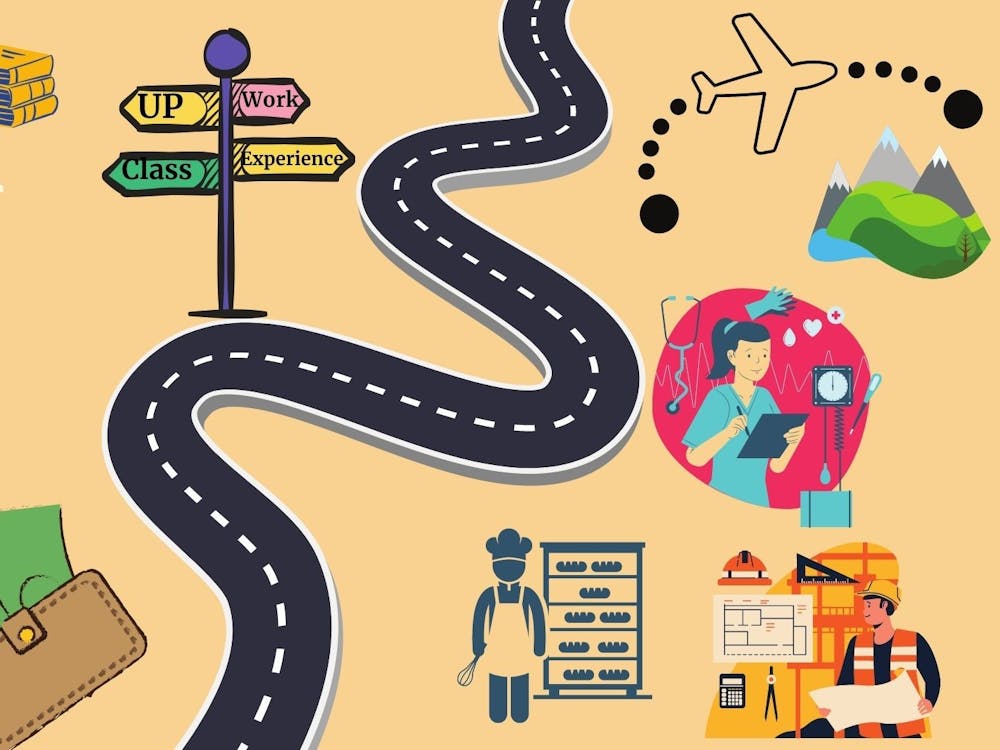“It was about learning it to do well on the test so that I could get the good grade and move on. I never really cared to retain the knowledge.”
After hearing that, I paused my podcast. I stared into the silhouette where my reflection should be, if not blocked by 48 chrome tabs, two syllabi and my email inbox. But that wasn’t really what I was staring at.
I was looking for someone from my past, someone who cherished learning. Someone who loved to read, write and think critically.
It dawned on me then: that someone is gone. Because the longer I stayed, the more my motives changed. The more classes I took, the more jaded I became.
I looked at that dark shadow on the screen and realized it wasn’t about learning at all any more. Now it’s just about getting a piece of cardstock to prove that I had the wherewithal to endure.
What kind of education is that?
I’ll admit, I should share some of the blame. I should be more motivated and make the most of my time while I’m in school. But I can’t. I’m one semester away from graduation, and all I can think about is surviving my classes so I can get my degree.
The pandemic didn’t help anything, of course. Online classes were (and still are) somewhat miserable, making it harder to engage. But this is something I started feeling long before the cruel embrace of COVID-19.
It’s been the same cycle for as long as I can remember. Get the material, memorize the material before the exam, take the exam, pass and move on. That’s the game, and despite my professors’ best efforts, the rules haven’t changed.
Why, then, did I come to get a degree at all? Well, put simply, because I didn’t have a choice.
That’s not to discredit all the hard work and tireless effort professors put into their lesson plans and trying to get through to their students. You have a job to do, but so do we.
College has become nothing more than a stepping stone. A high stakes, high stress, fast paced trail to what is hopefully a more successful and lucrative career. Yes, we might have important life experiences, make lifelong friends and make some good memories along the way, but at the end of the day, I’m here to move up and move on. As cold as it might sound, when those four years come to a close, I’m gone.
A four year university was supposed to be about broadening my horizons, exposing me to new and interesting things and learning about the world and my place in it. Those elements came in fleeting moments, but the working world has turned my degree into a necessary box on a resume, and that’s why I’m here.
And when I leave, and start applying for jobs, what makes me any different than someone who’s been working for the last four years? Why am I so much more valuable to employers?
Realistically, when I get onto the office floor, I’ll be learning everything I need to know when I’m there. So, fancy education or not, I’m practically at square one anyway.
But just like currency, the value of the college degree inflated fast. There was a rising demand for bachelor’s degrees which, over time, made work experience practically meaningless.
Jobs that didn’t previously require a degree started to, and it hurt those who have been working for years and proving themselves in ways I never did.
Going to school doesn't necessarily make me smarter, harder working or more competent than someone who left high school and realized college wasn’t going to work for them. They played the game of survival just as much as I did, but they don’t have a diploma to prove it.
Why can someone with five, 10 or even 20 years of work experience not get a job that a college graduate can? One box is checked, and one isn’t.
For those who couldn’t pursue higher education, who didn’t have the opportunity or had too much on their plate to make it work, that can really hurt. And as more and more people get degrees, it becomes even harder for those working people to progress their careers.
And even now, having nearly completed college, it’s not just about the degree anymore. The longer I went to school, the more debt I incurred, the more doors closed behind me because of it. Going to a four year university was supposed to open doors, not slam them shut.
I’m a journalist, it’s what I want to pursue. It’s my passion. But now, unlike before, my passion has a price. If college was more accessible, or even if I had just gone to a cheaper school, I could’ve worked a lower salary job after graduating to establish myself.
Now, though, I’ve got bills. I’ve got loans to refinance, and debts to pay. My options have changed, and it will make going into journalism even more difficult than it already was.
I’m not alone, and many students are even finding themselves defaulting on their loans, despite all the promises colleges made them. That said, I’m excited for all the student debt that is being forgiven. But for those of us with private loans, it won’t do us any good in that department.
As much as I complain, I will never not be grateful for the opportunity. It has changed me as a person, and provided experiences I wouldn’t have had otherwise. But that doesn’t change the fact that our education system is flawed, along with our expectations of pursuing four year degrees.
The economist in me is screaming, “But more education means more human capital, more utility in the work force and more benefit to the development of the economy.” Yeah econ me, I know. But clearly that’s not the whole story.
The story here is a tale as old as time (or it sure feels like it). College is too expensive for a lot of people, and even for those who find ways to afford it, they might suffer lasting financial damage. I think we need to understand that there’s more to being educated than a Bachelor's degree.
It is becoming more common for people to stop seeking four year degrees, especially since the pandemic. Alternatives to a degree are becoming more prominent, and the financial barriers to getting a college degree are gradually coming down. More online options with additional flexibility are opening up, and the world seems to be exploring new kinds of education.
But even coming back to our good friend, the four year degree, we should expect more out of our experience. And trust me, I know, it’s a situation where what you put into it is what you get out of it. However, the way the system and our expectations of college are set, we’re already halfway out the door when we show up.
When recruiters came to my high school, one of the first graphs they showed me, almost without fail, was how much their graduates make after school. Or a list of all the careers their graduates have. Graduates this, graduates that, so on and so forth.
Before I ever stepped foot on a campus, I was primed to think about a successful departure. Because that’s what education has become. Nothing more than another rung on the tall ladder of life.
What kind of education is that?
The kind that needs change. The kind that needs careful rethinking for reasons beyond just what I wrote here. The kind that just isn’t good enough for what students endure, and the sacrifices that we made to get here.
And as I approach my last semester, maybe it’s time I try and find that person in me again, too. It might be my last chance to recapture what college should have been.
Austin De Dios is the Editor-in-Chief of The Beacon. He can be reached at dedios22@up.edu.
Have something to say about this? We’re dedicated to publishing a wide variety of viewpoints, and we’d like to hear from you. Voice your opinion in The Beacon.








